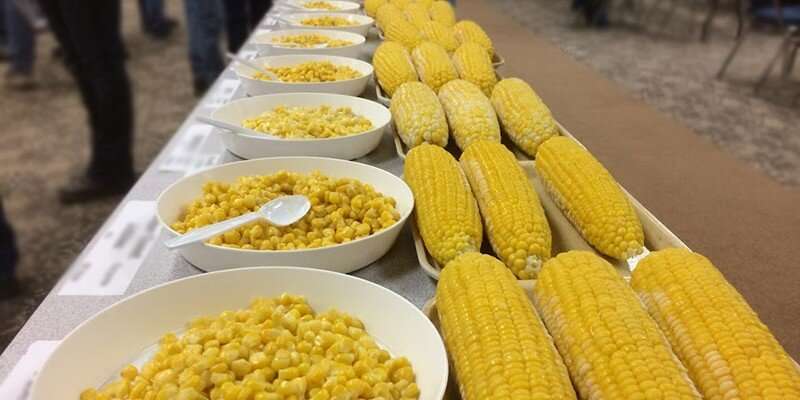 New research from Cornell University shows that plants can communicate with each other when they come under attack from pests.
New research from Cornell University shows that plants can communicate with each other when they come under attack from pests.Foodfarmnewstv
FADAMA 111 PROJECT ADDITIONAL FINANCING
Bestchange
Search This Blog
Labels
- News (460)
- Images speak (42)
- Press Release (39)
- livestock (31)
- FACAN (29)
- Editorial (25)
- GM (20)
- Seed (20)
- Biotechnology (19)
- wheat (16)
- Research (15)
- Cassava (14)
- AFAN (13)
- Global news (12)
- Special Report (12)
- Rice (11)
- Image Speaks (9)
- Maize (9)
- Soil (9)
- Yam (8)
- Bt cowpea (7)
- Coconut (7)
- Fertilizer (7)
- Cocoa (6)
- Disease (6)
- Ginger (6)
- Potato (6)
- World Soil Day (6)
- Animals (5)
- Apple (5)
- Oil Palm (5)
- Tomatoe (5)
- new (5)
- Cashew (4)
- Climate change (4)
- Fish (4)
- NCARD (4)
- Organic agric (4)
- World Food Day (4)
- Interview (3)
- National Council meeting on Agriculture. (3)
- Plant & genes (3)
- Plant genes (3)
- Project (3)
- Sesame (3)
- Shea butter (3)
- AI Research on Agriculture (2)
- Achia (2)
- African Cherry (2)
- Communique (2)
- Cotton (2)
- Extension services (2)
- Gene editing (2)
- HAPPY NEW YEAR (2)
- Horticulture (2)
- Insurance (2)
- Kenaf (2)
- Opinion (2)
- Sorghum (2)
- Sunflower (2)
- Tomato (2)
- Turmeric (2)
- bt cotton (2)
- seasons greetings (2)
- Artemesia (1)
- Biodiversity (1)
- Birds (1)
- Carrot (1)
- Discovery (1)
- Donkey (1)
- Facts sheets (1)
- Flash Flood (1)
- GES (1)
- GMO Rice (1)
- Garlic (1)
- Genetic (1)
- Groundnut (1)
- Jute bag (1)
- Locust bean (1)
- MERRY XMAS (1)
- Machinery (1)
- Mango (1)
- Milk (1)
- Okra (1)
- Post-harvest losses/ Food Waste (1)
- Presentation (1)
- Seaweed (1)
- Senate (1)
- Soybean (1)
- Tumeria (1)
- Walnut (1)
- flood (1)
- fruits (1)
- millet (1)
- water (1)
Total Pageviews
SPONSORED

Nigerian Institute of Soil Science- NISS
Translate Food Farm News to Hausa, Igbo, Yoruba and over 100 Languages
Latest News
Tuesday, 29 October 2019
Plants alert neighbors to threats using common 'language'
 New research from Cornell University shows that plants can communicate with each other when they come under attack from pests.
New research from Cornell University shows that plants can communicate with each other when they come under attack from pests.Monday, 28 October 2019
Aspirin may halve air pollution harms

A new study is the first to report evidence that nonsteroidal anti-inflammatory drugs (NSAIDs) like aspirin may lessen the adverse effects of air pollution exposure on lung function. The team of researchers from the Columbia Mailman School of Public Health, Harvard Chan School of Public Health, Boston University School of Medicine published their findings in the American Journal of Respiratory and Critical Care Medicine.
Sunday, 27 October 2019
Brave new world: Simple changes in intensity of weather events 'could be lethal'
 Hurricane Dorian is the latest example of a frightening trend. Extreme weather events are becoming more frequent, more severe and more widespread as a consequence of climate change. New research from Washington University in St. Louis provides important new insights into how different species may fare under this new normal.
Hurricane Dorian is the latest example of a frightening trend. Extreme weather events are becoming more frequent, more severe and more widespread as a consequence of climate change. New research from Washington University in St. Louis provides important new insights into how different species may fare under this new normal.Saturday, 26 October 2019
A new concept could make more environmentally friendly batteries possible

A new concept for an aluminium battery has twice the energy density as previous versions, is made of abundant materials, and could lead to reduced production costs and environmental impact. The idea has potential for large scale applications, including storage of solar and wind energy. Researchers from Chalmers University of Technology, Sweden, and the National Institute of Chemistry, Slovenia, are behind the idea.
Friday, 25 October 2019
Sweet corn growers, processors could dramatically increase yield, profit
 In an industry struggling to maintain profitability, it's curious that U.S. processing sweet corn -- the corn that ends up in cans and freezer bags -- is falling so far below its potential. Yet, that's what a new study in PLOS ONE clearly demonstrates.
In an industry struggling to maintain profitability, it's curious that U.S. processing sweet corn -- the corn that ends up in cans and freezer bags -- is falling so far below its potential. Yet, that's what a new study in PLOS ONE clearly demonstrates.Thursday, 24 October 2019
Genomes of parasitic mites harming the world's bees sequenced
 Honey bee colony collapse has devastating consequences for the environment, the global economy, and food security worldwide.
Honey bee colony collapse has devastating consequences for the environment, the global economy, and food security worldwide. Wednesday, 23 October 2019
Toxin promotes cattle-to-cattle transmission of deadly Escherichia coli strains
 Shiga toxin subtype 2a (Stx2a) may play a key role in promoting the colonization and transmission of life-threatening Escherichia coli strains in cattle, according to a study published October 3 in the open-access journal PLOS Pathogens by Tom McNeilly of the Moredun Research Institute, David Gally of the University of Edinburgh, and colleagues. As these bacteria evolve ways to increase the activity of Shiga toxins, they may become more of a threat to human health.
Shiga toxin subtype 2a (Stx2a) may play a key role in promoting the colonization and transmission of life-threatening Escherichia coli strains in cattle, according to a study published October 3 in the open-access journal PLOS Pathogens by Tom McNeilly of the Moredun Research Institute, David Gally of the University of Edinburgh, and colleagues. As these bacteria evolve ways to increase the activity of Shiga toxins, they may become more of a threat to human health.Tuesday, 22 October 2019
The last mammoths died on a remote island
 The last woolly mammoths lived on Wrangel Island in the Arctic Ocean; they died out 4,000 years ago within a very short time.
The last woolly mammoths lived on Wrangel Island in the Arctic Ocean; they died out 4,000 years ago within a very short time. Monday, 21 October 2019
You don't have to go cold turkey on red meat to see health benefits
 A new study has found that halving the amount red and processed (RPM) meat in the diet can have a significant impact on health, reducing the amount of LDL 'bad' cholesterol in the blood which cuts the risk of developing heart disease.
A new study has found that halving the amount red and processed (RPM) meat in the diet can have a significant impact on health, reducing the amount of LDL 'bad' cholesterol in the blood which cuts the risk of developing heart disease.Sunday, 20 October 2019
Machu Picchu: Ancient Incan sanctuary intentionally built on faults
 The ancient Incan sanctuary of Machu Picchu is considered one of humanity's greatest architectural achievements. Built in a remote Andean setting atop a narrow ridge high above a precipitous river canyon, the site is renowned for its perfect integration with the spectacular landscape.
The ancient Incan sanctuary of Machu Picchu is considered one of humanity's greatest architectural achievements. Built in a remote Andean setting atop a narrow ridge high above a precipitous river canyon, the site is renowned for its perfect integration with the spectacular landscape.
Subscribe to:
Posts (Atom)




